Call of Duty is the third best-selling video game franchise of all time, yet it’s not infallible. For every momentous campaign moment in the Call of Duty series campaigns, there are just as many dumb moments we can’t help but remember.
These can range from tone-deaf lines of dialogue which go viral, to comically peculiar decisions from the developers. However, there is one thing that all of these instances of Call of Duty campaign moments have in common. That is that gamers just can’t wrap their heads around how stupid they appear.
As such, we have combed through over 20 years of titles and created this concentrated list. A list of the 10 Dumbest Call of Duty Campaign Moments of All Time.
Portrayal of Frank Woods (Black Ops 4)
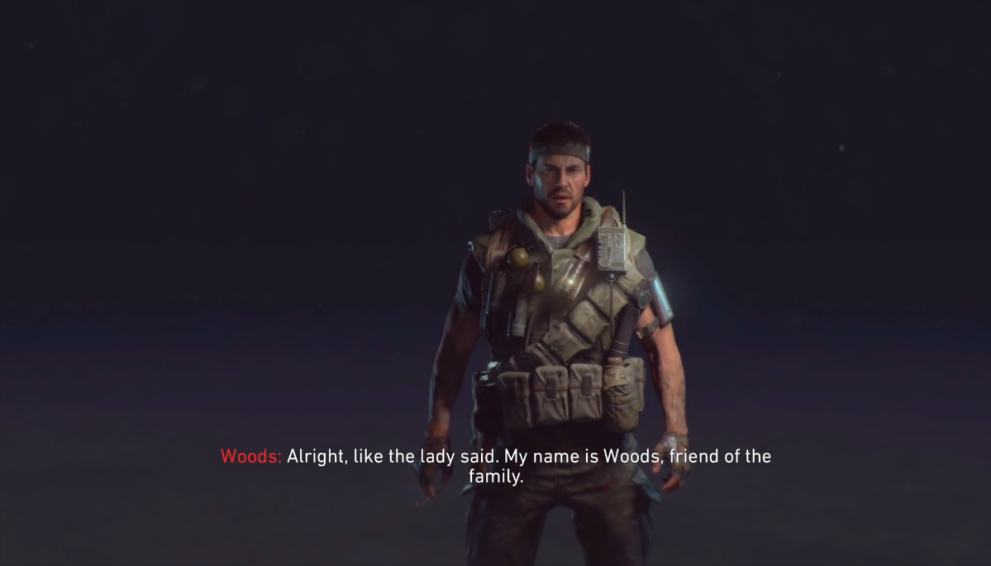
There are many things Call of Duty: Black Ops 4 does right. It created a faster pace due to its heightened mobility and introduced the series to the battle royale genre. However, this unique title is alone in one count – its complete disregard for a traditional campaign experience.
Black Ops 4 supposedly ditched a traditional campaign due to time restraints. However, in its place were the 14 training missions for the game’s Specialist characters. As such, the fifteenth call of Duty had to be placed relatively low on our list.
The worst aspect of this campaign replacement was the inclusion of fan-favorite loudmouth character Frank Woods. His hair-trigger fuse and comic one-liners had become staples of the Black Ops subseries. Black Ops 4’s tarnished the character through its Specialist Headquarters. As such, it is one of the dumbest decisions made in a Call of Duty title.
Woods’ doppelganger proclaims multiple one-liners to the player. He states that bouncing a grenade off of a wall is “lit AF”. He goes on to inform the player of “Team Fartjam” hiding out in a structure ahead, among other tasteful lines.
With Woods’ high standing in the community, it’s a shame to see his likeness used in such a way. I say likeness as all the returning legacy characters in the mode are revealed to be clones.
Phew!
The Eiffel Tower Falls (Modern Warfare 3 (2011)
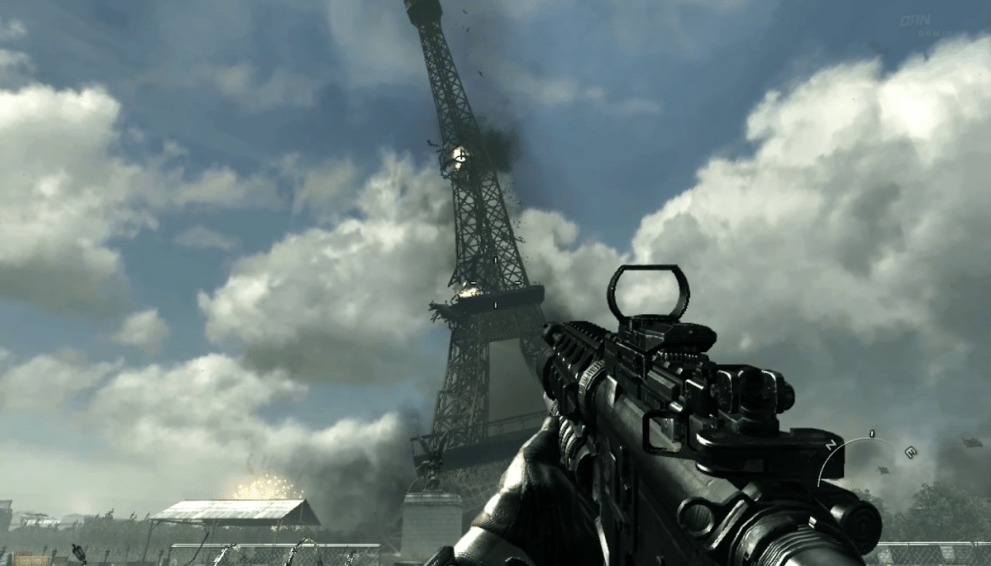
The Call of Duty franchise is a series with multiple personalities. On one hand you have the grounded military realism of World at War. On the other you have the bombastic power fantasy of Infinite Warfare.
2011’s Modern Warfare 3 positions itself on the action-packed spectacle end of the spectrum. The penultimate title of the seventh console generation’s Modern Warfare trilogy is dumb on so many occasions. In the best possible way.
Modern Warfare 3 brings the series’ conflict to the shores of continental Europe and the United States of America. However, unlike 2019’s Modern Warfare trilogy, Modern Warfare 3 is more than happy to indulge itself. This comes forth in a fiery rupture of some Michael Bay-esque explosions and setpieces.
This dumb spectacle arguably comes to a boil in Modern Warfare 3’s toppling of the Eiffel Tower. This comes forth at the halfway point of the title’s campaign.
The visual of sandbags and entrenched fighting surrounding France’s most recognizable monument is spectacle enough. However, to see it crumble through aerial bombardment is just awe-inspiring, and dumb enough to position itself on this list.
‘Deep Cover’ (Modern Warfare III (2023))
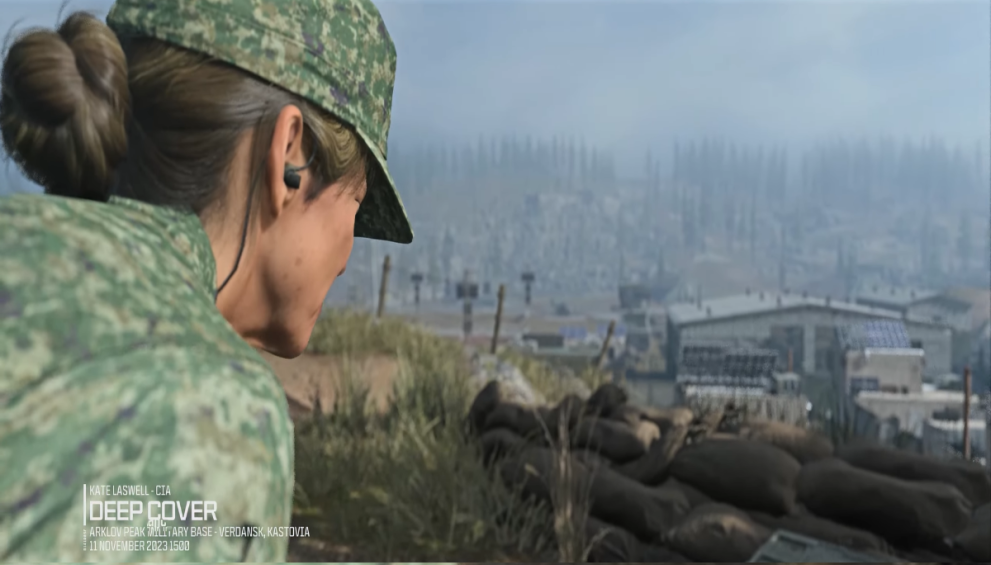
Stealth missions are always a mixed back in Call of Duty. For every ‘All Ghillied Up’ there’s a mission like Modern Warfare III‘s ‘Deep Cover’.
Now, when talking about the dumbest part of ‘Deep Cover’s sneaky shenanigans, I’m not referencing the overly sensitive awareness of the enemy patrols. What ‘Deep Cover’ suffers from is a dumb issue that has plagued Call of Duty campaigns since stealth sections have been so lazily shoehorned in.
Kate Laswell is a CIA operative who is under such close surveillance that she cannot take down enemies from within the base. However, she turns on a dime to gutting enemy combatants, and leaving their bodies in the open, as soon as she has crossed Infinity Ward’s invisible line for the stealth section to be over.
Stealth is a mechanic hundreds of titles have mastered. However, Call of Duty has a tendency to either provide stellar FPS offerings or flounder in the constraints of the system. Beyond Deep Cover’s dumb stealth section, the mission also suffers from a tedious, exposition-heavy cutscene, and an atypical escape section – full of permanent sprinting and jumping into a waiting helicopter.
Cliffhanger Cutscene Ending (Ghosts)
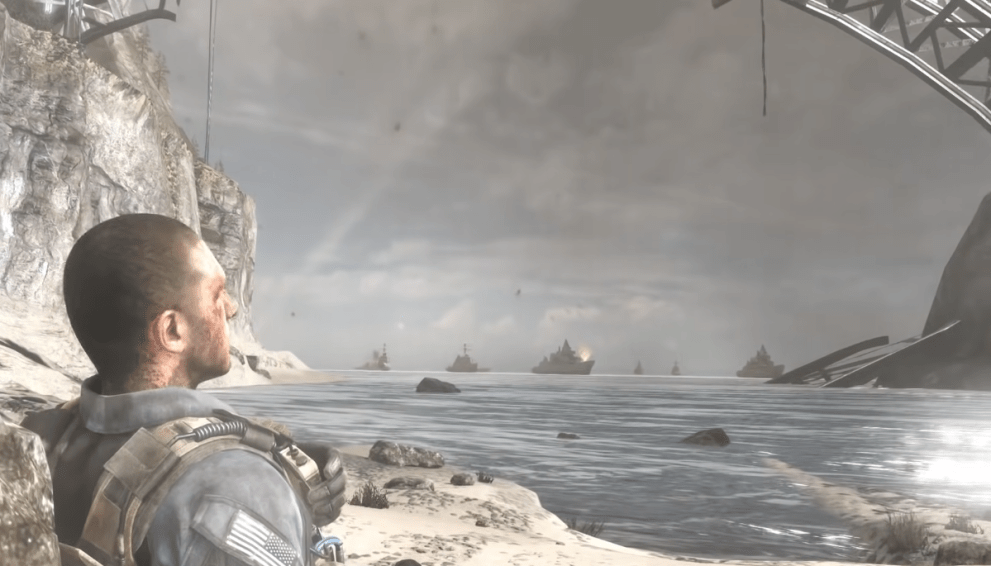
Call of Duty: Ghosts is a title that requires almost no introduction. The title was panned across the board by gamers who were finally settling into series fatigue. Ghosts’ name has become synonymous with the rushed schedule and sub-par improvements of the series.
Online conversation for Ghosts mostly revolves around the confusion surrounding Activision’s fascination with “high-resolution scans” in their dog models. However Ghosts is an arguable downgrade from Call of Duty: Black Ops II. Beyond that, its lackluster apocalyptic narrative form a uniquely unimpressive title.
Ironically, considering the lambasting of the title in the previous paragraph, the ending of Ghosts is its single worst part. After a violent confrontation with the title’s residential turncoat bad guy – Gabriel T. Rorke – the player sits on a beachhead, looking at allied ships on the horizon.
As Logan and ‘Hesh’ Walker sit back and enjoy the end of the campaign, the indoctrinated enemy Commander Rorke surprises them both. He ends up dragging Logan off as the credits begin to play.
In a post-credits scene where Logan is trapped in a jungle cage, we are led to believe that he is due to be indoctrinated like Rorke. As such, the cliffhanger ending epitomizes the hubris and paint-by-numbers attitude Activision displayed in Call of Duty: Ghost’s campaign.
Of course nothing came from it. But the title was expectant that players would be intrigued enough to have the cliffhanger pay off.
‘Paying Respects’ (Advanced Warfare)
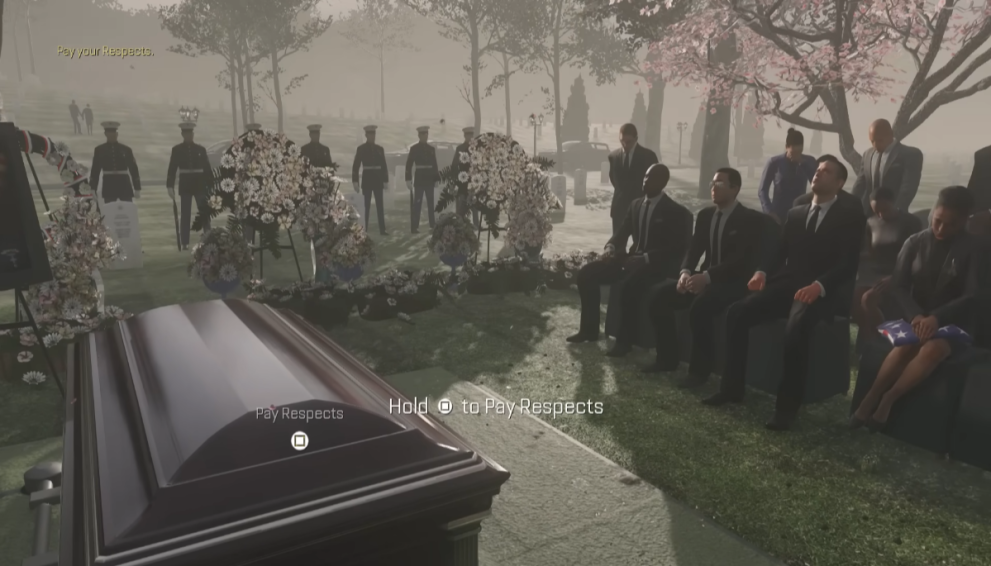
You most likely already know about Call of Duty: Advanced Warfare‘s ‘Press F to pay respects’ button prompt. Riffed on in online discourse since its 2014 debut, this instance of narrative interactivity in the campaign has reached an unenviable status in gaming communities.
The concept is not the worst thing in the worst thing in the world. In fact, Call of Duty has used button prompts and haptic triggers to lend to the narrative grounding since. However, this instance of interactivity is particularly egregious.
Unfortunately, it rings particularly tone-deaf. An intensive effort had been put in to create an emotional grounding for the ensuing burial of Private Irons. From a lengthy cutscene to a stoic speech, a sombre ceremony is presented in front of the protagonist.
Just after the dense atmosphere and sombre tone have been created, they are then shattered. This is inelegantly done through the insert of a prompt which is particularly distasteful.
‘Train Go Boom’ (Black Ops 3)
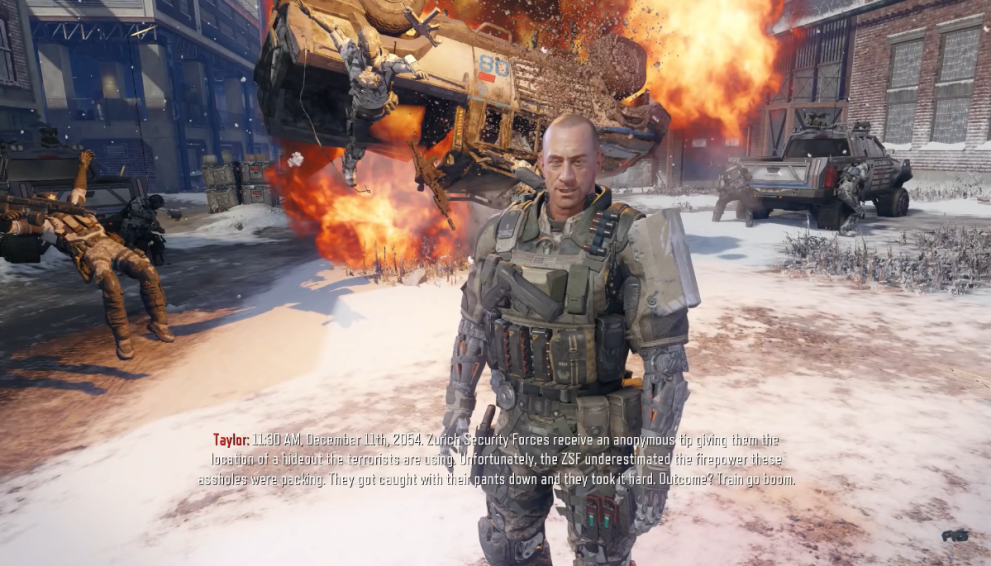
‘Press F to pay respects’ may be a particularly viral dumb line from a Call of Duty campaign. However, that’s not to say it’s the only one.
Call of Duty: Black Ops 3‘s science-fiction campaign is a bombastic narrative that does raise some interesting moral questions for the player. The second campaign mission of Black Ops 3 is ‘Mind Simulation’. It spends its first three minutes building the atmosphere and stakes of its setting.
Its opening cutscene culminates in an explosive terrorist attack on a train heading to Zurich. The mission then seemingly proceeds towards another devastating military failure.
However, the narrator John Taylor minimizes all the emotional weight of the train explosion with one supremely dumb line. In exchange for a halfhearted Marvel-esque cheeky quip, the outcome of the terrorist attack is made light of with the installment’s most infamous line; ‘Outcome: Train go boom’.
Train Crash Scene (WW2)
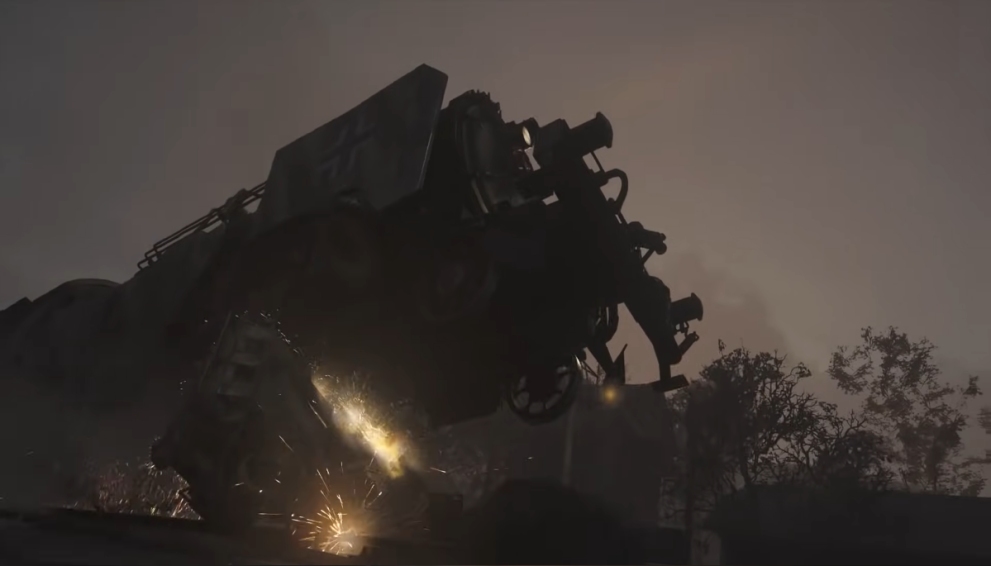
Call of Duty: WWII was seemingly a breath of fresh air. After nearly ten years away from the historical setting of the eponymous Second World War, gamers were ready to revisit the conflict. What had previously felt old hat in 2008 was new again in 2017.
Call of Duty: WWII could have been a polished experience in a revived setting, especially after almost a decade of modern and science fiction settings. Instead, in a period that should have housed a grounded and mature tale of comradery and fraternity, gamers experienced a blockbuster explosion-filled literal train wreck.
With the combined efforts of the protagonist and companion Robert Zussman, a Nazi supply train is derailed. This provides an extensive blow to the Axis front. Yet the impact of the moment is cut back as the train crash setpiece extends for an entire minute.
The plot armor of the two campaign characters – as both are relatively unscathed by the disaster around them – is ridiculous. Beyond that, the length of the crash takes a possibly awe-inspiring spectacle and drags it along.
War Crimes in Ending Cutscene (Vanguard)
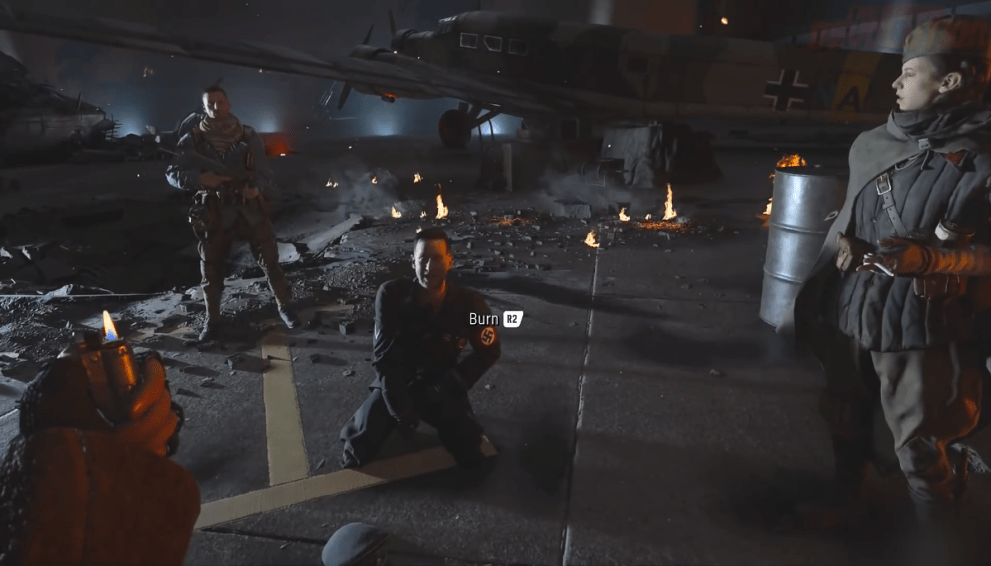
Some Call of Duty titles do engage with their military setting to create a sordid expression of the trials of war. Though not all installments are like Valiant Hearts or Battlefield 1, they don’t need to be – and that’s okay.
Call of Duty: Vanguard has a perplexing relationship with the gritty realities of war. The campaign is a down-to-earth WW2 tale. However, it still emerges on the other side – as a Hollywood portrayal of a grand conflict. The dumb decisions of Vanguard’s narrative are brought to their conclusion. As the eponymous Task Force Vanguard confronts the main antagonist; SS Oberst-Gruppenführer Freisinger.
It’s a victory for peace and freedom, isn’t it?
Well, of course, it is. However, Call of Duty muddies the waters by having Task Force Vanguard actively stop him from surrendering. He is hoping to help the Allies, in exchange for Nazi secrets and priceless art.
Of course, I am not defending a war criminal. Yet, the information and treasures he was hoping to barter with were clearly valuable as they are kept by the protagonists. Instead of capturing the surrendering Freisinger, he is soaked in gasoline and then put to death by being set alight.
Even in the crescendoing conclusion to Vanguard’s six-hour campaign, this decision has always irked me – as a moral issue, and a result of dumb, lazy, black-and-white writing. The Geneva Convention explicitly prohibits the kind of behavior our ‘heroes’ exhibit.
Freisinger is a war criminal, and the audience obviously wants retribution for all of his acts of villainy. However, the moral high ground is given up when the player is asked to flick a lighter at his gasoline-soaked body to burn a surrendering leader alive.
And if gamers decide that the desecration of their body is not something they are comfortable with, your Soviet comrade Polina Pertrova decides for herself.
Forcing the player to watch as narrative control is taken out of their hands for a dumb campaign conclusion is the least of Vanguard’s issues. However, it epitomizes the insincerity the Call of Duty franchise often struggles with.
Salen Kotch Kills Own Men (Infinite Warfare)
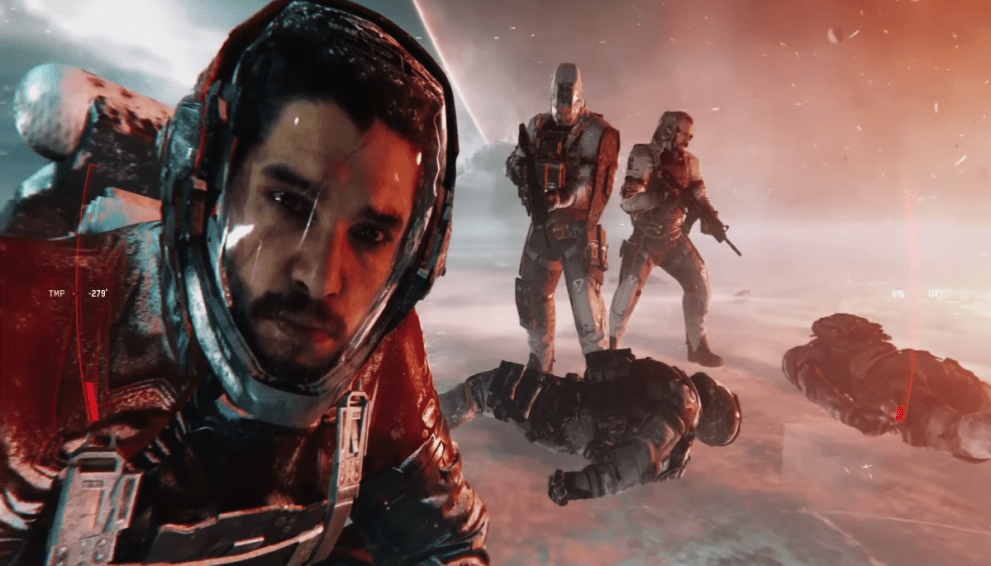
Call of Duty villains are very much a mixed bag. Gamers have fought against cookie-cutter antagonists, and multi-layered betrayers – yet no campaign antagonist has disappointed many players as much as Infinite Warfare’s Salen Kotch.
Kotch’s portrayal is pulled off with a stellar performance from Game of Thrones‘ Kit Harington. However, that is where the compliments end, and the dumb decisions from Activision begin. Kotch is the atypical bad guy, and the game needs you to know that – as such, our first face-to-face interaction has him doing the quintessential ‘bad guy’ thing. He kills one of his own men.
Standing on the ice-covered surface of Venus, he spouts a monologue regarding how; “Care clouds judgment” and as “that is why you cannot win”. Kit Harington’s character then proceeds to shoot one of his men, purely to accentuate just how uncaring this villain is.
The action doesn’t make massive narrative sense, as the enemy faction – the SDF – is a struggling revolutionary group with fewer resources than the protagonists. However, the dumbest detail about this act is that it accentuates that Infinity Ward just couldn’t trust such a talented actor to hold their own as a multi-faceted villain. Instead, they resort to making him partake in the most quintessential ‘bad guy’ action, just behind twiddling their comically large moustache while laughing.
‘Violence and Timing’ (Modern Warfare II (2022))
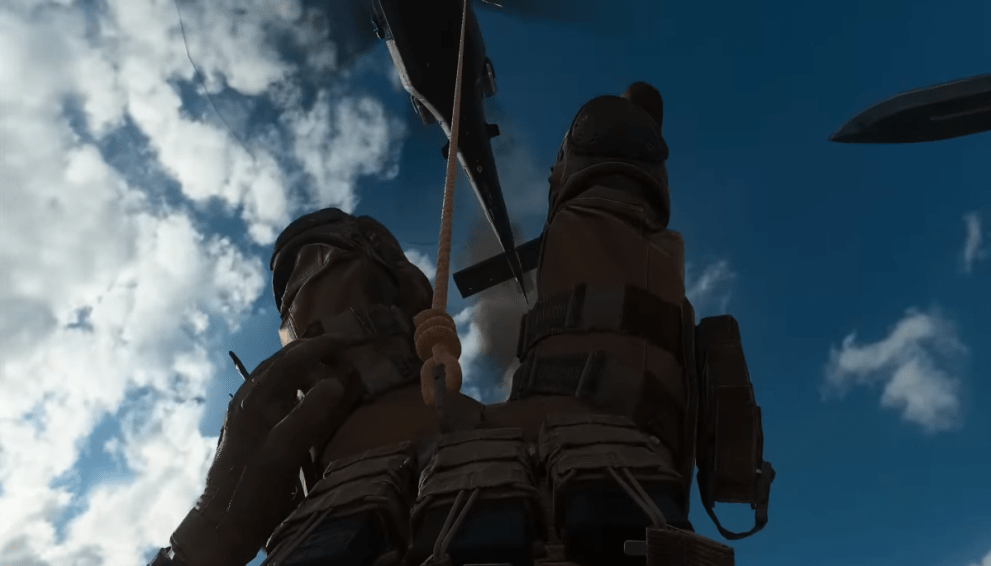
As stated before, Call of Duty is a franchise with two distinct personalities that are constantly at war with one another. While some titles break ground on depicting the harrowing details of war, other installments go all-in on creating a blockbuster action-packed sandbox for their players.
There is no issue with the series alternating between these forms, yet what rocks the boat is when both elements struggle for dominance in a single title. Beyond that, there is arguably one title that suffers from this tonal conflict most – 2022’s Call of Duty: Modern Warfare II.
In the quintessential culmination of this fight for tonal dominance, we take control of Kyle ‘Gaz’ Garrick – one of the contemporary Modern Warfare trilogy’s three playable characters. ‘Violence and Timing’ is Modern Warfare II’s tenth mission. In it, Gaz is shot from a helicopter and is suspended above a chase scene.
Firing his sidearm at inverted enemy vehicles, the setpiece is bombastic and fun – if a little silly. However, the mission comes aground when it is put in the context of the title – and subseries’ – grounded reality and more mellow tone. Missions such as ‘Borderline’ – where you patrol the Mexican border with the USA – are dark and impactful, and gymnastic gunplay simply makes a mockery of that established tone.
Despite the dumb subverting of the game’s hard-earned tone and the drawn-out sequence of Warzone-inspired car chase sections, the mission isn’t a complete bust. The setpieces are a spectacle, and gamers enjoy the action.
But, Call of Duty’s indecisiveness and narrative dissonance are dumb campaign mistakes we see over and over again in this franchise.
What about checking out Twinfinite’s Ultimate Call of Duty Campaigns Trivia Quiz? If you’re excited about the franchise’s future, check out the Five Things We Want to See in Black Ops 6?









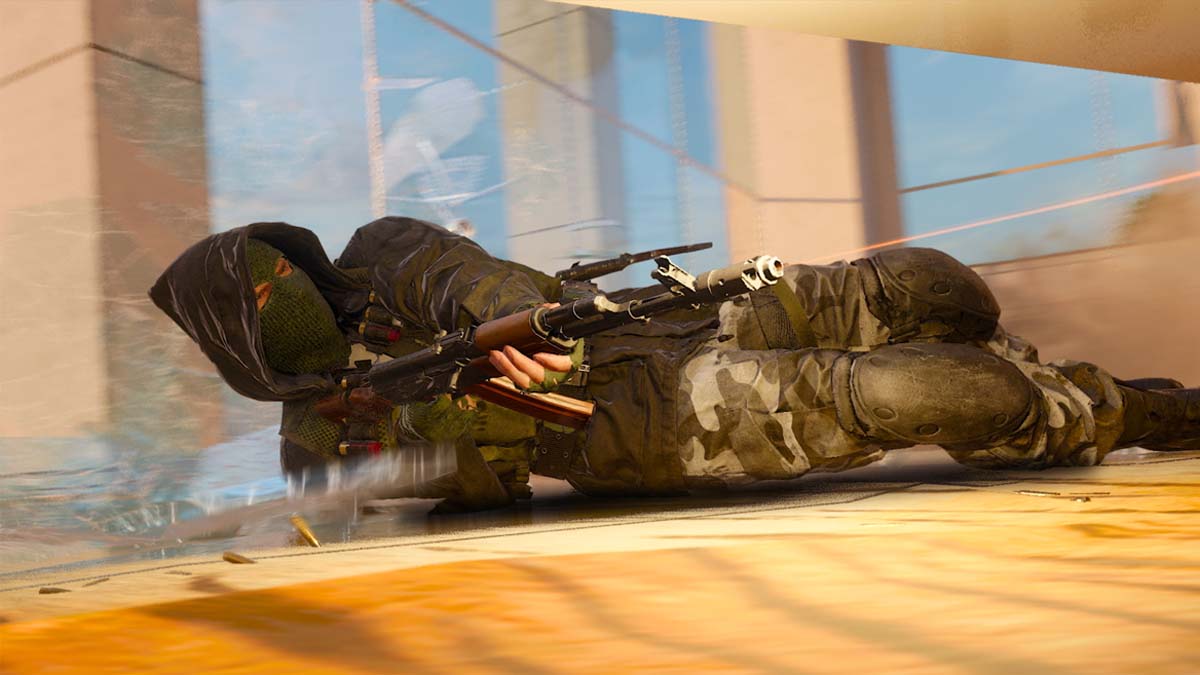


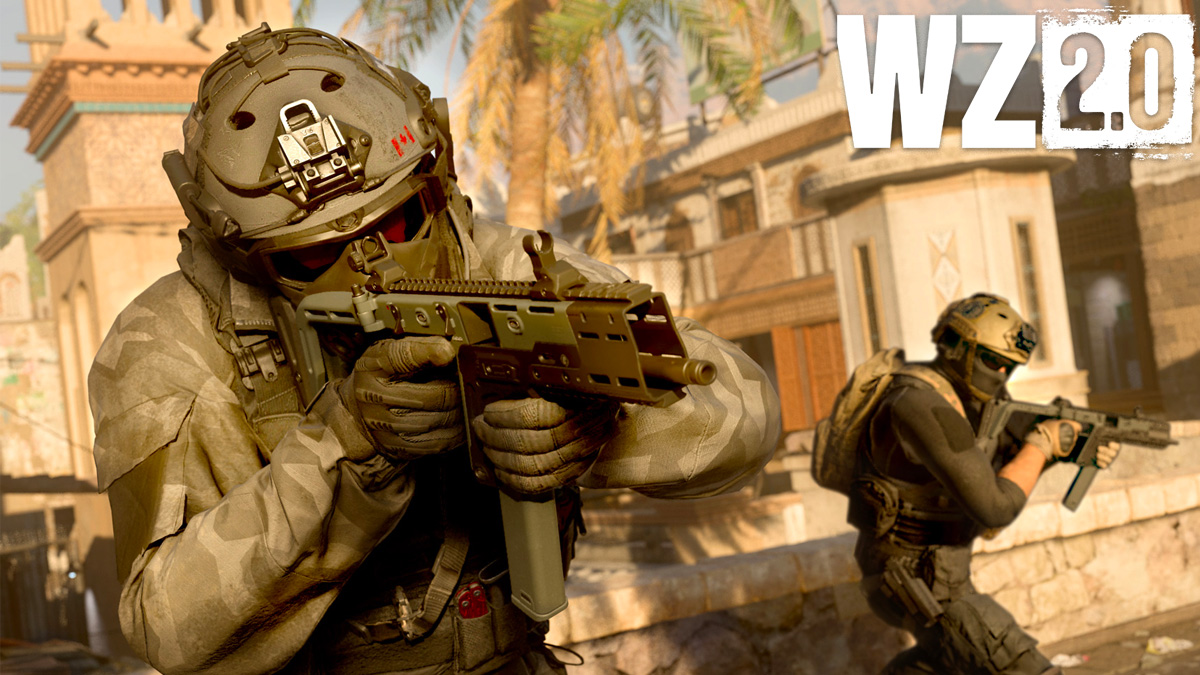
Updated: Jul 29, 2024 10:16 am